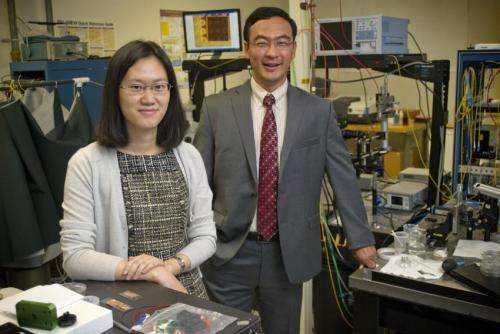UT Arlington researcher's device could detect vapors in environment or a person's breath

A University of Texas at Arlington researcher has received a three-year, $400,369 National Science Foundation grant to build a handheld device that could analyze a person's breath to reveal whether certain dangerous gasses are present that need more immediate medical attention.
Yuze (Alice) Sun, an assistant professor in electrical engineering, said the device is a nanoscale gas chromatography tool that separates vapors from a person's breath, a room or an area, then detects what harmful vapors are present.
"Our sensors can separate up to hundreds of vapors in complex samples and identify the ones that could be used as chemical markers, Sun said. "Many devices like this are large and don't always have separation capabilities to provide detection specificity."
Khosrow Behbehani, dean of the College of Engineering, said Sun's research shows promise in so many areas.
"While the focus of this research is on respiratory gas analysis," Behbehani said. " it can potentially have other applications such as assessing whether air for breathing is healthy in confined populated areas such as public transportation vehicles and airplanes."
Sun said the device also could be used in environmental and security settings.
For instance, homeowners could use the device in their home to determine if certain allergens or toxic chemicals were present.
Firefighters could use the device to determine whether there were accelerants present at a fire. Homeland security agents could use the device to determine whether explosives were present in luggage or on a person.
Weidong Zhou, electrical engineering professor and co-principal investigator on the project, said the healthcare area is the most interesting.
"This is a very hot area – personalized medicine," Zhou said. "The device can target a person's individual healthcare needs and will have the power to detect very, very low vapor concentration because the sensors are extremely sensitive."
Sun said one of medical applications the device is set to address is to detect a panel of vapors that are specific to diabetes from exhaled breath.
"Eventually, our goal is to non-invasively monitor a person's blood sugar level instead of having that diabetic prick their finger to do a blood test," Sun said.
Provided by University of Texas at Arlington


















